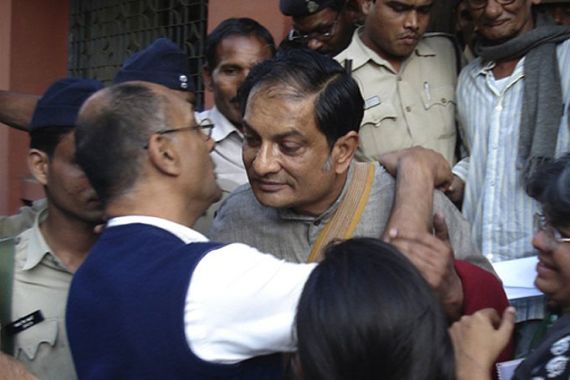Jailed Indian social activist gets bail
Decision by the country’s highest court overturns refusal by a lower court to grant Dr Binayak Sen bail in February.

 |
| Dr Binayak Sen, Centre, greets relatives in Raipur in December [AFP/file photo] |
India’s Supreme Court has granted bail to a doctor and leading rights activist sentenced to life in prison on charges of helping Maoist fighters.
Announcing their decision on Friday, the two-judge bench also cast doubt on Dr Binayak Sen’s conviction for sedition, which drew widespread international condemnation.
Academics and civil rights organisations had condemned the conviction, with Amnesty International adopting him as a prisoner of conscience.
The decision of the country’s highest court to grant bail overturns the refusal by a lower court to do so in February. The court has yet to rule on his appeal.
The doctor is currently jailed in Raipur in the central state of Chhattisgarh. His release may take several days as Friday’s ruling must be taken up by the lower court which will set the bail conditions.
The charges against Dr Sen stem from visits he made to a prison in Chhattisgarh to treat rebels and other inmates.
Authorities said he used those visits to pass notes between jailed communist rebel leaders and their compatriots in the field.
However, the rights activist insists he only provided medical treatment during those visits.
Before his arrest, Sen had been running health clinics and training health workers in tribal communities in Chhattisgarh – a stronghold of India’s Maoist movement.
He spent 22 months in a prison during his trial before the Supreme Court released him on in 2009. He was arrested again after his conviction.
Sedition charge trashed
During Friday’s hearing the Supreme Court bench questioned elements of the sedition case against Sen, particularly the relevance of pro-Maoist booklets found in his possession.
“If (Mahatma) Gandhi’s autobiography is found in someone’s house, does that make him a Gandhian?” queried Justice CK Prasad.
And Justice HS Bedi observed that even if Sen were a Maoist sympathiser, “this does not make him guilty of sedition.”
Sen’s lawyer, SK Farhan, said the court ruling offered hope for the upcoming appeal.
“There’s absolutely no evidence that he is a member of any Maoist organisation,” Farhan said.
Speaking to reporters outside the court, Sen’s wife, Ilina Sen, said it was a “very emotional” moment.
“The legal process will continue to plague us for some more time, but the fact is that this particular phase of the nightmare is over and it is just beginning to sink in,” she said.
Sen was awarded the 2008 Jonathan Mann Award for global health and human rights and his case has drawn international attention, with 40 Nobel laureates calling his sentence “unjust” and demanding his release.
“Dr Sen is an exceptional, courageous, and selfless colleague, dedicated to helping those in India who are least able to help themselves,” the Nobel laureates said in their statement released in February.
The Maoist rebels, also called Naxalites, have been fighting for more than three decades in several Indian states, demanding land and jobs for agricultural labourers and the poor.
In recent years hundreds of people, including police personnel, have been killed in the violence.